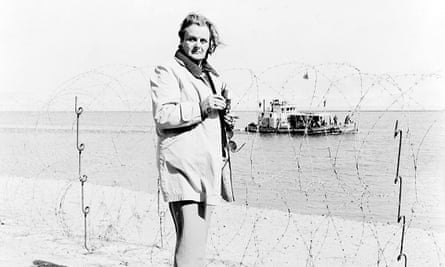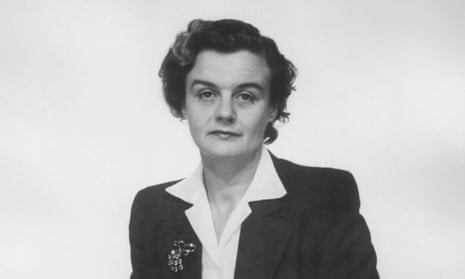Clare Hollingworth, who has died aged 105, was one of the most active war correspondents of the 20th century and the one who managed to circumvent official rules banning women in order to report on the British North African campaign in 1941.
Hollingworth began her reporting career in eastern Europe in 1939 and quickly established her reputation with a brilliant scoop about German troop movements on the Polish border that heralded the outbreak of the second world war. She borrowed the consul-general’s car to drive into Germany across a closed border, even receiving a salute from the Germans as she had a flagged car. On the way back she noticed a large hessian screen preventing anyone from seeing the valley below. But the wind blew the hessian away from its scaffolding to reveal scores of German tanks lined up to enter Poland.
The consul-general did not believe her story until she produced some of the goods she had bought in Germany. Then, while she telephoned her report to the Daily Telegraph, he sent a secret message to the Foreign Office.
The following year Hollingworth was in Bucharest covering the abdication of King Carol – and the subsequent riots incited by the Iron Guard – for the Daily Express. For two months she had consistently managed to avoid the Guardists’ stringent censorship by sending one story through the press bureau stamped by the official censor and another, completely different, version dictated over the phone to Geneva. When the security police eventually came to her flat to arrest her, she stripped and rang her friend Robin Hankey at the British Legation. She told the security police authoritatively: “You can’t possibly arrest me, I’m naked.” Within minutes Hankey arrived and escorted the blanket-covered reporter to the embassy.
In 1941 Hollingworth was sent to Egypt, where she worked alongside the official war correspondents, although, as a woman, she was denied the formal accreditation that she needed to travel openly to any of the forward areas. She chafed under these restrictions. “Cairo may have been the nerve centre for disseminating information, but for me the news was out there in the desert with the British troops,” she said.
Hollingworth managed, however, not merely to attend official press conferences and briefings, but also embarked on more trips, for longer and under more dangerous conditions, than any other female reporter, and was often behind enemy lines. She soon found herself at loggerheads with General Bernard Montgomery (later Viscount Montgomery of Alamein), whose opposition to women in the frontline was notorious.
At the end of the desert campaign, after the Eighth Army had captured Tripoli, he suddenly ordered her back to Cairo. Ever resourceful, Hollingworth immediately joined US military operations based in Algiers and became affiliated to the Chicago Daily News. General Dwight D Eisenhower welcomed the presence of experienced female correspondents, as long as they asked for no special treatment, something Hollingworth was always meticulous about, claiming: “I would never use my femininity to get a story that a man could not get.” She thrived on danger and believed that the more dangerous the assignment the better the story.
In 1950 Hollingworth moved to Paris and began working for the Manchester Guardian. She immediately started making regular forays to Algeria and developed excellent contacts among the left-wing FLN (Front de Libération Nationale), as well as being accredited to the French army. By the early 60s she was living in Algiers for months at a time and survived the ransacking of her hotel bedroom by OAS (Organisation Armée Secrète) terrorists who objected to what she was writing. On another occasion she held off a gang of OAS gunmen with nothing more than an imperious threat to use her shoe.

While other journalists skirted around the casbah, the walled warren of twisting streets that was home to the best FLN sources, Hollingworth made it her business to go there almost every day, convinced that because she was a woman she would receive no worse than a bucket of slops emptied over her head. This had nothing to do with being brave, she maintained: “If you put me in a rickety lift, I’d be terrified. It’s just that I don’t feel frightened under machine-gun fire. The excitement of the job overcomes it.”
Hollingworth produced a steady stream of good stories for the Guardian from the Middle East, including in early 1963 the first indication that Kim Philby had defected to the Soviet Union. Harold Macmillan had already denied that Philby was the “third man” in the Burgess and Maclean affair and the paper was reluctant to run the story for fear of enormous libel damages. Three months later, when Hollingworth returned to London, Philby was still missing, and she wrote a careful account of his disappearance from Beirut – and probable flight to Moscow – which was duly followed up by the other papers and later confirmed in parliament.
In 1962 she won the Hannen Swaffer award for Woman Journalist of the Year and the What The Papers Say award for the best news reporting of the year for her coverage of the Algerian war.
From 1963 until 1967, Hollingworth was defence correspondent for the Guardian – the first woman to hold the post. She had made herself familiar with military hardware over the years, and had a particular interest in aircraft, having learned to fly in the 40s. The new job took her to many of the world’s capitals, reporting on developments in western defence and Nato proposals, but she was also in the thick of post-imperial trouble spots such as Sarawak and Aden.
In the late 60s Hollingworth went to Vietnam, but not, as was expected of many female journalists, to write about hospitals or orphanages. “Of course that’s important,” she explained recently, “but in a war situation they are soft stories. The frontline is the thing that really matters because the future depends on it at that moment.”
Daughter of Albert and Daisy Hollingworth, she was born in Knighton, near Leicester, into a middle-class family and derived her fascination with warfare from regular visits with her father, an industrialist, to battlefields such as Naseby, Bosworth and Agincourt.
Intending to make her career in politics, she became a secretary at the League of Nations Union (LNU) and while there began writing articles for a variety of small publications. In 1936, she married Vandeleur Robinson, a fellow LNU worker, but the marriage broke up during the war and they divorced in 1951. The following year she married the journalist Geoffrey Hoare, who worked for the News Chronicle. He died in 1965.
In the early 70s Hollingworth went to Beijing for the Daily Telegraph as its first resident staff correspondent in China. This was a period of intense change and she met Zhou Enlai and other members of the politburo, including Mao Zedong’s wife, Madame Jiang Qing. In the later years of her life she divided her time between France, Britain and Hong Kong, from where she made frequent visits to China. She was there in 1989 when the student uprising began and watched the tragedy of Tiananmen Square from a fifth floor balcony of the Peking hotel.
She had hoped, aged 79, to be invited to cover the Gulf war and spent five nights sleeping on the hard floor of her Hong Kong flat in preparation. But it was one of the few conflicts of the 20th century that she missed. In 1990 Hollingworth published her autobiography, Front Line, which disappointed some who had hoped for more revelations about her private life. But the hallmark of Hollingworth’s journalism was her supreme professionalism and her ability to present facts objectively rather than promote a cause or write about personalities, least of all her own.
In recent years she became a VIP fixture at the Foreign Correspondents’ Club in Hong Kong, but trouble with her eyesight meant that, in spite of her determination to be independent, she needed the help of two live-in companions.
In 2015 Patrick Garrett published a biography of his great-aunt, Of Fortunes and War: Clare Hollingworth, First of the Female War Correspondents, which revealed that, although Hollingworth had given up her habit of drinking beer for breakfast, she still kept her shoes by her bedside in case she had to leave in a hurry.
She is survived by a stepdaughter, Hilary, from her second marriage, and by a niece, Jennifer, and nephew, Richard.






Comments (…)
Sign in or create your Guardian account to join the discussion